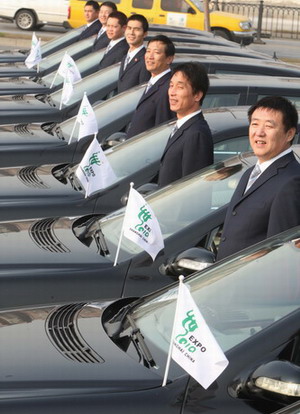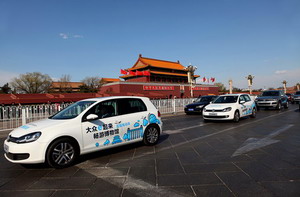Car rentals hit top gear as road to growth beckons
Updated: 2011-08-11 09:26
By Hu Yinan and Wang Yan (China Daily)
|
|||||||||||
Money, management
|
 |
|
Shanghai Volkswagen Leasing Co assembled a batch of cars for rental during World Expo 2010. [Photo / Others Provided] |
One of the auto rental industry's primary features, He of TopOne said, is oligopoly, in which a few players individually affect the market but don't control it.
"It's a capital-intensive business," He said. "Lots of capital is required. The more money is involved in a sector, the more an oligopoly or monopoly is needed. Additionally, industry participants often operate in chains, which necessitate sophisticated management capabilities.
"Money and management - these are fairly high entry barriers. It's not a business where two or three people with 10-20 million yuan can just make things happen. That's impossible," He said.
Most of the industry's big names have plans to have their stocks listed in the United States. China Auto Rental has made an open agenda to be listed in two to three years. Cheyou Auto Leasing, Haina's primary shareholder in Zhejiang, expects to do so before 2013.
Meanwhile, Bloomberg reported in March that eHi might seek its initial public offering in New York as early as this year. When approached by China Daily, however, company chairman Zhang said he has no "definite timetable".
"This (getting listed) would be a positive influence to the industry. It'd make the business more regulated and rational," Zhang said.
China's auto rental companies flourished in 2006 and 2007 when the two top global players, Hertz International and Avis, failed to adapt their stores to the Chinese business environment and, as a result, largely suspended their business in the country.
Frozen credit markets, recessions and US automaker bankruptcies since 2008 coincided with a boom in China's own car rental sector. And as market conditions improved, foreign capital started to return to China.
Goldman Sachs led a $70 million investment in eHi last year. Japanese automaker Mitsubishi poured $20 million into its joint venture, Haina. Hertz is rumored to be competing against China Auto Rental to acquire TopOne. And China Auto Rental itself is cooperating with Enterprise Holdings, which operates Enterprise Rent-A-Car, the largest car rental company in North America.
"I see the participation of foreign capital as an inevitable trend. China's auto rental chains would not have developed at all without foreign capital to begin with," said TopOne's He.
Big days ahead?
China's auto rental industry is destined to boom with more people willing to spend on travel and with rising living standards, urbanization rates and costs of owning and driving a car, according to a 2010 study by Sinotrust, a leading auto industry consulting firm.
But the promises of growth are accompanied by an array of problems. At the end of last year, about 80 percent of China's 5,000 registered auto rental companies each had fewer than 50 cars. More than half of all companies were based in Beijing, Shanghai, Shenzhen or Guangdong's capital, Guangzhou.
In the absence of nationwide regulation, many small companies tend to rent private cars for their business and manage to avoid administrative penalty.
Xinhua attributed the lack of supervision to the abolition of temporary regulations on auto rental in late 2007 - new ones have yet to be drafted - a move that coincided with the start of the industry's rapid growth.
"The regulations are not in their place, or at least they're lagging far behind the sector's development," He said.
"Sometimes practitioners of the industry are riding in the gray area," eHi's Zhang said, "and the entire sector has no regulation to follow and be protected by."
Related Stories
China's burgeoning rental car market 2010-12-04 16:27
Booming car rentals lack regulations 2011-05-18 10:29
China Auto Rental halts taxi services business 2011-03-18 10:01
China rental car market changes with foreign investment 2010-12-04 15:51
- Shenhua Group in $8b Xinjiang coal projects
- Soybean imports set to maintain increase
- China's July car sales edge up
- China Railway drops $966m share placement plan
- Sino-US audit oversight co-op faces difficulties
- HKEx posts increase of 14% in H1 profit
- Trade surplus rises on surprise export surge
- Yuan rises to 17-year high













